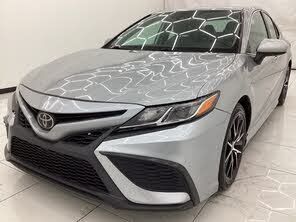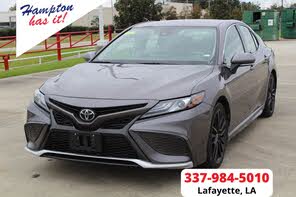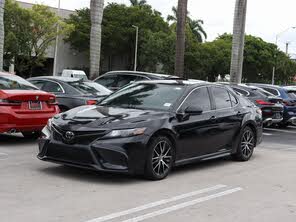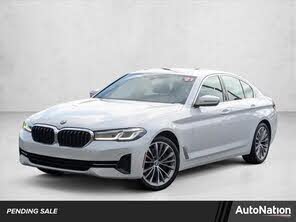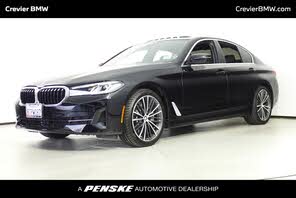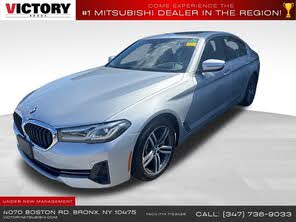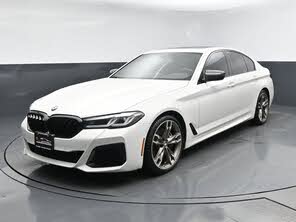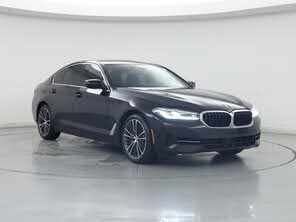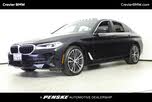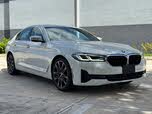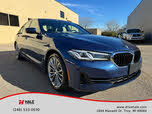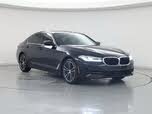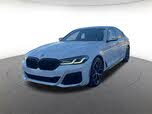2021 Toyota Camry vs 2021 BMW 5 Series
Overview | |
MSRP$25,045 | MSRP$54,200 |
Listings1445 | Listings295 |
Ratings & Reviews | |
User Reviews | User Reviews |
Expert reviews7.8 out of 10 | Expert reviews8.0 out of 10 |
Pros
Cons
| Pros
Cons
|
2021 Toyota Camry Reviews SummaryThe Toyota Camry has long been many new-car buyers’ default choice—but not because it’s interesting. Reliability and practicality have traditionally been the Camry’s strengths, not sportiness or style. Toyota tried to change that for the 2018 model year, when the Camry was last redesigned. The current-generation Camry adopted more extroverted styling, and engineers tried to make the driving experience more exciting, too. While Toyota’s approach has changed, the Camry still competes against the same array of midsize sedans, including the Honda Accord, Hyundai Sonata, Mazda 6, Nissan Altima, Subaru Legacy, and Volkswagen Passat. Changes for the 2021 model year include subtle styling tweaks, new infotainment displays, an upgrade to the Toyota Safety Sense 2.5+ (TSS 2.5+) package of driver aids, some changes to the dashboard trim, and the discontinuation of the Camry L trim level. That leaves the Camry LE as the new base trim level. The Camry offers buyers more choices than many rivals, encompassing three powertrains (inline-four, V6, and hybrid), six trim levels (LE, XLE, SE, SE Nightshade Edition, XSE, and TRD), and the choice of front-wheel drive (FWD) or all-wheel drive (AWD). Our test car was an AWD SE Nightshade Edition, positioned close to the middle of the lineup. | |
2021 BMW 5 Series Reviews SummaryBMW was once known for sports sedans, and the 5 Series was one of the most prolific of those sedans. Sitting between the 3 Series and 7 Series in size and price, previous generations of 5 Series were known for a balance of performance and luxury, with impeccable engineering throughout. Today, the BMW 5 Series is largely irrelevant. The 3 Series is now so big that there is less reason to upgrade, and most buyers are more interested in SUVs anyway. The competition—including the Audi A6, Jaguar XF, Mercedes-Benz E-Class, and Volvo S90—has also gotten better. That doesn’t mean BMW has given up on the 5 Series. The current generation (codename G30) arrived for the 2017 model year, but it gets a midcycle refresh (or LCI, short for “Life Cycle Impulse,” in BMW speak) for 2021. Major updates include a 48-volt mild-hybrid system, a bigger infotainment touchscreen, and subtle styling changes. The 2021 BMW 5 Series is not like the 5 Series models of old. That may drive away hardcore car fans, but the 2021 model makes a strong case to new-car buyers, maintaining sportier-than-average driving dynamics, along with the tech and luxury features expected of a car in this segment. | |
No video found | No video found |
Popular Features & Specs | |
Engine2.5L 203 hp I4 | Engine2.0L 248 hp I4 |
Drive TrainFWD | Drive TrainRWD |
Seating Capacity5 | Seating Capacity5 |
Horsepower | Horsepower248 hp @ 5200 rpm |
MPG City28 | MPG City25 |
MPG Highway39 | MPG Highway33 |
Engine | |
Engine Name2.5L 203 hp I4 | Engine Name2.0L 248 hp I4 |
Torque | Torque257 lb-ft @ 1500 rpm |
Horsepower | Horsepower248 hp @ 5200 rpm |
DrivetrainFWD | DrivetrainRWD |
Fuel Economy | |
MPG City28 | MPG City25 |
MPG Highway39 | MPG Highway33 |
Interior | |
Seating Capacity5 | Seating Capacity5 |
Key Features | |
Navigation System | Navigation SystemStandard |
Sunroof/Moonroof | Sunroof/MoonroofStandard |
Safety | |
Front Crash Overall5 | Front Crash Overall |
Side Crash Overall5 | Side Crash Overall |
Dimensions & Capacity | |
Cargo Space15.1 cu ft | Cargo Space14.0 cu ft |
Curb Weight3310 lbs | Curb Weight3765 lbs |
Height56.9 in | Height58.2 in |
Length192.1 in | Length195.8 in |
Width72.4 in | Width83.7 in |
Wheelbase111.2 in | Wheelbase117.1 in |
Maximum Payload925 lbs | Maximum Payload800 lbs |
Number of doors4 | Number of doors4 |
Overview | ||
MSRP | $25,045 | $54,200 |
Listings | ||
Ratings & Reviews | ||
User reviews | ||
Expert reviews | 7.8 out of 10Read full review | 8.0 out of 10Read full review |
Pros & cons | Pros
Cons
| Pros
Cons
|
Summary | The Toyota Camry has long been many new-car buyers’ default choice—but not because it’s interesting. Reliability and practicality have traditionally been the Camry’s strengths, not sportiness or style. Toyota tried to change that for the 2018 model year, when the Camry was last redesigned. The current-generation Camry adopted more extroverted styling, and engineers tried to make the driving experience more exciting, too. While Toyota’s approach has changed, the Camry still competes against the same array of midsize sedans, including the Honda Accord, Hyundai Sonata, Mazda 6, Nissan Altima, Subaru Legacy, and Volkswagen Passat. Changes for the 2021 model year include subtle styling tweaks, new infotainment displays, an upgrade to the Toyota Safety Sense 2.5+ (TSS 2.5+) package of driver aids, some changes to the dashboard trim, and the discontinuation of the Camry L trim level. That leaves the Camry LE as the new base trim level. The Camry offers buyers more choices than many rivals, encompassing three powertrains (inline-four, V6, and hybrid), six trim levels (LE, XLE, SE, SE Nightshade Edition, XSE, and TRD), and the choice of front-wheel drive (FWD) or all-wheel drive (AWD). Our test car was an AWD SE Nightshade Edition, positioned close to the middle of the lineup. | BMW was once known for sports sedans, and the 5 Series was one of the most prolific of those sedans. Sitting between the 3 Series and 7 Series in size and price, previous generations of 5 Series were known for a balance of performance and luxury, with impeccable engineering throughout. Today, the BMW 5 Series is largely irrelevant. The 3 Series is now so big that there is less reason to upgrade, and most buyers are more interested in SUVs anyway. The competition—including the Audi A6, Jaguar XF, Mercedes-Benz E-Class, and Volvo S90—has also gotten better. That doesn’t mean BMW has given up on the 5 Series. The current generation (codename G30) arrived for the 2017 model year, but it gets a midcycle refresh (or LCI, short for “Life Cycle Impulse,” in BMW speak) for 2021. Major updates include a 48-volt mild-hybrid system, a bigger infotainment touchscreen, and subtle styling changes. The 2021 BMW 5 Series is not like the 5 Series models of old. That may drive away hardcore car fans, but the 2021 model makes a strong case to new-car buyers, maintaining sportier-than-average driving dynamics, along with the tech and luxury features expected of a car in this segment. |
Video | No video found | No video found |
Popular Features & Specs | ||
Engine | 2.5L 203 hp I4 | 2.0L 248 hp I4 |
Drive Train | FWD | RWD |
Seating Capacity | 5 | 5 |
Horsepower | 248 hp @ 5200 rpm | |
MPG City | 28 | 25 |
MPG Highway | 39 | 33 |
Engine | ||
Engine Name | 2.5L 203 hp I4 | 2.0L 248 hp I4 |
Torque | 257 lb-ft @ 1500 rpm | |
Horsepower | 248 hp @ 5200 rpm | |
Drivetrain | FWD | RWD |
Fuel Economy | ||
MPG City | 28 | 25 |
MPG Highway | 39 | 33 |
Interior | ||
Seating Capacity | 5 | 5 |
Key Features | ||
Navigation System | Standard | |
Sunroof/Moonroof | Standard | |
Safety | ||
Front Crash Overall | 5 | |
Side Crash Overall | 5 | |
Dimensions & Capacity | ||
Cargo Space | 15.1 cu ft | 14.0 cu ft |
Curb Weight | 3310 lbs | 3765 lbs |
Height | 56.9 in | 58.2 in |
Length | 192.1 in | 195.8 in |
Width | 72.4 in | 83.7 in |
Wheelbase | 111.2 in | 117.1 in |
Maximum Payload | 925 lbs | 800 lbs |
Number of doors | 4 | 4 |
The 2021 Toyota Camry worked hard to shed the somewhat bland image associated with its predecessors, which often appeared in driver's education textbooks as the quintessential unexciting car. Toyota's designers attempted to inject some flair into the model by adding numerous styling details.
Some elements, like the flared wheel arches and thin headlights and taillights that visually widened the car, were successful. However, the SE, XSE, and TRD trims were criticized for their abundance of fake vents that contributed to a cluttered appearance. The LE and XLE trims had a somewhat clearer, but still large, grille. The underlying TNGA-K platform was shared with other Toyota models such as the larger Avalon sedan and the RAV4 SUV.
For 2021, Toyota made minor tweaks to the front-fascia styling for most trims, though these changes were not very dramatic. The TRD performance model retained unique styling elements like a larger rear spoiler, while the Nightshade Edition, based on the SE trim, showcased blacked-out exterior trim and wheels. Wheel options varied from standard 17-inch alloy wheels on the base LE trim, to optional 18-inch and 19-inch wheels on other models.
Inside, the Camry’s interior matched its exterior’s chaotic styling. The dashboard of the SE Nightshade Edition appeared as though it was amalgamated from two different cars. Toyota utilized a variety of trims including contrast stitching, piano black plastic, and plastic trim resembling carbon fiber, leading to a lack of a cohesive design theme. Even the materials seemed low-rent, which detracted from the overall appeal.
Conversely, the 2021 BMW 5 Series stood out as the most restrained design among BMW sedans. It didn't flaunt the dramatic design cues of the 3 Series nor did it possess the commanding presence of the 7 Series. Unlike many luxury cars that sought attention, the 5 Series opted for subtlety.
The 2021 model received a minor styling refresh that resulted in a sleeker look. The standard LED headlights were more streamlined, enhancing the car’s refined appearance. BMW's iconic twin-kidney grille was enlarged but avoided the exaggerated proportions seen on the 7 Series. Other updates included trapezoidal tailpipes, new L-shaped taillights, and revised front and rear bumpers for the M Sport Package. Although it was 1.2 inches longer than before, the 5 Series maintained a commendable drag coefficient of 0.27, promoting aerodynamic efficiency.
The interior of the 5 Series remained largely unchanged from previous models, featuring the quintessential BMW layout. The design ensured that even without the BMW badge, the identity was unmistakable due to elements like the touchscreen positioning, unique shifter, typefaces, and door chimes—each contributing to BMW's distinctive style.
Materials in the 5 Series varied, with lower trims featuring SensaTec upholstery and optional upgrades to Dakota or Nappa leather. The 540i xDrive test car featured Nappa leather, a $2,500 option, which added to the luxurious feel. Aluminum trim with a scale pattern further elevated the upscale ambiance, although the standard leather-wrapped sport steering wheel seemed a bit out of place in terms of its size and heft, considering the effortlessness required in maneuvering the car.
















The 2021 Toyota Camry provided a base powertrain that consisted of a 2.5-liter four-cylinder engine, branded as the Dynamic Force engine, delivering above-average output for a naturally aspirated engine. In most trims, it generated 203 horsepower and 184 pound-feet of torque with front-wheel drive (FWD), and 202 hp and 182 lb-ft with all-wheel drive (AWD). The XSE trim, with its dual-exhaust system, bumped these figures slightly to 206 hp and 186 lb-ft with FWD, and 205 hp and 185 lb-ft with AWD. An eight-speed automatic transmission was standard across all configurations.
In a market where turbocharged four-cylinder engines were increasingly common, Toyota continued to offer a naturally aspirated 3.5-liter V6 in the Camry, yielding 301 hp and 267 lb-ft of torque, paired with the same eight-speed automatic. The V6 and hybrid powertrains were limited to FWD only. The hybrid variant, combining a 2.5-liter four-cylinder engine with electric assistance, achieved a total system output of 208 hp.
The SE Nightshade Edition tested was equipped with the base four-cylinder engine and AWD. Despite its seemingly ordinary setup, the Camry impressed with its spirited Dynamic Force engine, which exhibited an eager, sports car-like propensity to rev and even had a pleasant sound. The chassis offered a commendable balance between handling and ride quality, making it enjoyable to drive in corners without sacrificing comfort. While the steering was responsive and precise, it lacked tactile feedback. Overall, the driving experience was engaging, especially considering the Camry’s segment.
The AWD system, available since 2020, carried over unchanged for 2021. Derived from the RAV4's AWD setup, it could deliver up to 50% torque to the rear wheels, reverting to FWD when additional traction wasn’t necessary. Importantly, the AWD hardware didn’t compromise passenger or cargo space.
Meanwhile, BMW's 2021 5 Series offered an extensive range of powertrain options. The entry-level 530i sedan featured a 2.0-liter turbocharged four-cylinder engine producing 248 horsepower and 258 pound-feet of torque, clocking a zero to 60 mph time of 5.9 seconds. The top speed was electronically limited to 130 mph with standard tires, and 155 mph with optional performance tires. An eight-speed automatic transmission and rear-wheel drive (RWD) were standard, while xDrive AWD was available as an option.
Next in line was the 540i, equipped with a 3.0-liter turbocharged inline-six engine and a 48-volt mild hybrid system. Although incapable of solely electric driving, this system powered accessories and enabled a more aggressive engine start-stop mechanism. The 540i delivered 335 hp and 362 lb-ft of torque, allowing it to accelerate from zero to 60 mph in 4.9 seconds with RWD, and 4.6 seconds with AWD. The eight-speed automatic transmission was the sole option, and the vehicle's top speed varied similarly to the 530i depending on tire selection.
The tested 540i xDrive felt sportier than many competitors, thanks in part to its precise handling enhanced by optional adaptive dampers, and the smooth operation of its six-cylinder engine. However, it strayed from being a definitive "Ultimate Driving Machine," conveying a luxurious essence with a sporty guise rather than providing a pure driving experience.
For those seeking greater performance, the M550i xDrive presented a 4.4-liter twin-turbo V8 with 532 hp and 553 lb-ft of torque, reducing the zero to 60 mph time by a full second compared to the 540i xDrive. The high-performance M5 model featured an even more potent version of the V8, producing 617 hp in its Competition spec, and achieving a zero to 60 mph time of just 3.1 seconds, with a top speed of 190 mph when equipped with the optional M Driver’s Package.
BMW also offered the environmentally-friendly 530e plug-in hybrid, which combined a 2.0-liter four-cylinder engine, an electric motor, and an eight-speed automatic transmission for a total system output of 288 hp and 310 lb-ft of torque. Capable of driving solely on electric power for meaningful distances, the 530e accelerated from zero to 60 mph in 5.7 seconds. The 2020 model boasted a 21-mile electric range, though EPA figures for the 2021 model were pending at the time.
The interior of the 2021 Toyota Camry provided an ample amount of rear headroom and legroom compared to other midsize sedans, while front headroom and legroom were somewhat below average. Nevertheless, the front seats offered sufficient adjustability to accommodate various seating preferences, providing comfort and support with excellent outward visibility.
The Camry’s trunk space measured 15.1 cubic feet, about average for its segment but notably less than the 16.7 cubic feet offered by the Honda Accord. In-cabin storage was limited, typical of a sedan, with small cupholders and door bottle holders, and items often got stuck in the door storage bins’ crevices. Toyota included analog controls for key functions, which were easy to use but not ideally positioned. Dual-zone automatic climate control was available on higher trims.
By contrast, the 2021 BMW 5 Series offered a spacious interior befitting its substantial exterior dimensions. Front-seat space was competitive, and despite rear seat measurements appearing slightly smaller on paper, they provided ample room for passengers. The trunk space in the 540i was 14.0 cubic feet, more than that of an Audi A6 or Mercedes-Benz E-Class, with a convenient 40/20/20 split-folding rear bench for transporting longer items.
Our 540i xDrive test car came with 16-way power front seats featuring four-way lumbar support, memory settings, heating, and ventilation. These seats provided a balance of cushioning and supportive bolstering without being overly plush. However, forward visibility was hampered by the high, long hood, making road positioning and parking challenging. The surround-view camera system was a useful addition for parking.
The 2021 Toyota Camry came equipped with a standard 7-inch touchscreen infotainment system, featuring Apple CarPlay and Android Auto connectivity, Amazon Alexa compatibility, Bluetooth, Siri Eyes Free voice control, and SiriusXM satellite radio (with a three-month free trial). Higher trim levels upgraded to a 9-inch touchscreen, WiFi capability for up to five devices, navigation, and a nine-speaker JBL audio system. A 10-inch head-up display was also available on the XSE and XLE trims.
A single USB media port and two USB charge ports were standard along with a 12-volt outlet. Graphics on the touchscreen were plain but functional, and navigating through the menus was straightforward.
The 2021 BMW 5 Series, on the other hand, featured a 12.3-inch infotainment touchscreen with the latest iDrive 7 system, complementing a 12.3-inch Live Cockpit Professional digital instrument cluster. Standard features included Apple CarPlay/Android Auto connectivity, Bluetooth, SiriusXM 360L satellite radio, and a WiFi hotspot.
Both the instrument cluster and the infotainment touchscreen boasted excellent graphics. While the infotainment screen was conveniently located, the instrument cluster layout could be confusing, substituting a power meter for a tachometer unless in sport mode. The rotary knob controller provided a tactile interface for infotainment functions, simplifying usage compared to complex touchpad systems. Voice control via “Hey BMW” and gesture controls were also available, although gesture controls could be imprecise and difficult to master.
The 2021 Toyota Camry received the highest safety accolades, earning a “Top Safety Pick+” rating from the IIHS and a five-star overall rating from the NHTSA. The TSS 2.5+ package of safety features was standard, including adaptive cruise control, automatic emergency braking, forward-collision warning with pedestrian detection, lane-departure warning, automatic high beams, and traffic-sign recognition. Enhanced capabilities such as detection of cyclists and oncoming vehicles/pedestrians during left turns were new for this year. Toyota’s Rear Seat Reminder was also standard, alerting drivers to check the rear seats for children or pets.
Blind-spot monitoring and rear cross-traffic alert were available as standalone options, standard on XLE and XSE trims, and optional on LE and SE trims.
The 2021 BMW 5 Series, rated based on its 2020 counterpart, achieved a "Top Safety Pick+" from the IIHS with top scores in crash tests and front-crash prevention. Its standard headlights received a “marginal” rating, while optional lights were rated “good.” The NHTSA had not recently published ratings for this model.
Standard safety features included lane-departure warning, automatic emergency braking, blind-spot monitoring with rear cross-traffic alert, and automatic high beams. The Driving Assistance Plus Package offered additional features such as adaptive cruise control, traffic-jam assist, lane-keep assist, and emergency stop assist. While many of these features were standard on less-expensive cars, BMW’s sophistication in driver-assist technology, particularly the smooth operation of adaptive cruise control, was noteworthy.
CarGurus highlights

According to CarGurus experts, the overall rating for the 2021 Toyota Camry is 7.8 out of 10, while the 2021 BMW 5 Series scores 8.0 out of 10. Based on these scores, the recommendation leans towards the BMW 5 Series as the superior choice in terms of overall quality, technology, and powertrain options. However, the Toyota Camry stands out for its safety, reliability, and surprisingly enjoyable driving experience at a lower price point. In the end, the best choice depends on whether a consumer prioritizes luxury and advanced features or safety and reliability at a more affordable cost.
Choose the 2021 Toyota Camry if:
- Safety and reliability are your top priorities.
- You desire a car that balances practicality with a surprisingly engaging driving experience.
- You appreciate comprehensive standard safety features and excellent safety ratings.
Choose the 2021 BMW 5 Series if:
- You seek a luxury sedan with a refined, understated design and excellent build quality.
- Advanced and sophisticated technology features, including an intuitive infotainment system and high-quality materials, are important to you.
- You desire a car that offers a variety of powerful and efficient powertrain options, including performance-oriented and hybrid models.
CarGurus highlights

According to CarGurus experts, the overall rating for the 2021 Toyota Camry is 7.8 out of 10, while the 2021 BMW 5 Series scores 8.0 out of 10. Based on these scores, the recommendation leans towards the BMW 5 Series as the superior choice in terms of overall quality, technology, and powertrain options. However, the Toyota Camry stands out for its safety, reliability, and surprisingly enjoyable driving experience at a lower price point. In the end, the best choice depends on whether a consumer prioritizes luxury and advanced features or safety and reliability at a more affordable cost.
Choose the 2021 Toyota Camry if:
Shop Now- Safety and reliability are your top priorities.
- You desire a car that balances practicality with a surprisingly engaging driving experience.
- You appreciate comprehensive standard safety features and excellent safety ratings.
Choose the 2021 BMW 5 Series if:
Shop Now- You seek a luxury sedan with a refined, understated design and excellent build quality.
- Advanced and sophisticated technology features, including an intuitive infotainment system and high-quality materials, are important to you.
- You desire a car that offers a variety of powerful and efficient powertrain options, including performance-oriented and hybrid models.

By: CarGurus + AI
At CarGurus, our team of experienced automotive writers remain at the heart of our content operation, conducting hands-on car tests and writing insightful guides that are backed by years of industry experience. To complement this, we are harnessing AI to make our content offering more diverse and more helpful to shoppers than ever. To achieve this, our AI systems are based exclusively on CarGurus content, ratings and data, so that what we produce is both unique to CarGurus, and uniquely helpful to car shoppers.




